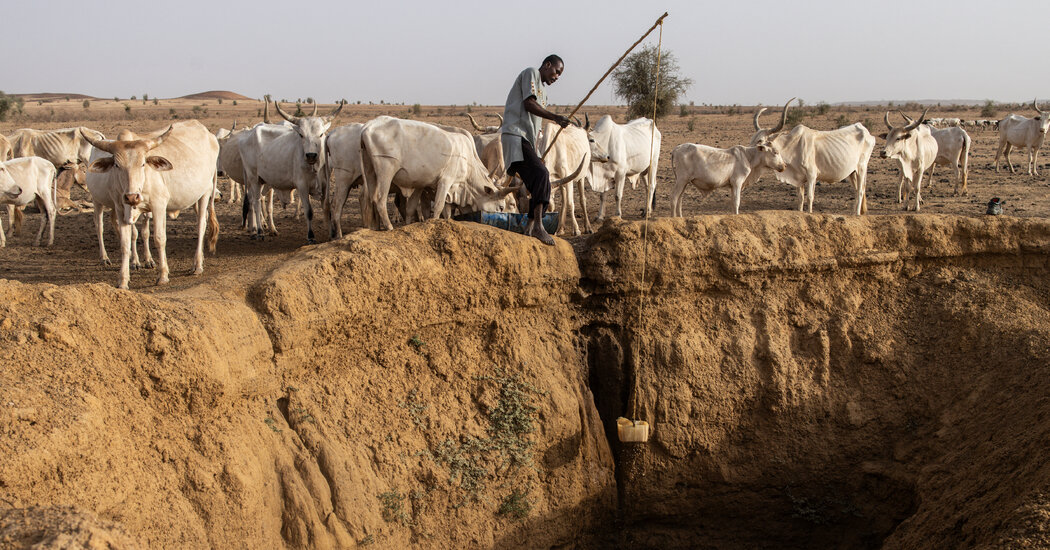The amount of financial assistance that rich nations give to poor ones to adapt to storms, heat waves and other perils of climate change is declining, the United Nations warned in a report released on Wednesday.
Wealthy countries provided roughly $26 billion for climate adaptation in 2023, a 7 percent drop from the previous year, according to the United Nations Environment Program. Those nations are now “unlikely” to meet a major pledge to provide at least $40 billion in annual aid by 2025, the agency said. And even that amount is only a fraction of what developing countries may need to cope with worsening climate shocks.
The findings are another sign that global efforts to tackle climate change have noticeably flagged. President Trump is withdrawing the United States from the 2015 Paris climate agreement, in which virtually every country agreed to limit the emissions that are rapidly heating the planet.
While other world leaders are still planning to meet without Mr. Trump next month in Belém, Brazil, for the annual U.N. summit on climate change, those talks are already getting off to a rocky start.
Only about one-third of the countries have met a deadline to update their national plans to curb emissions, the United Nations said in a separate report on Tuesday.
“The overall sluggish progress should send shock waves through every citizen,” said Ilana Seid, an ambassador from Palau who chairs the Alliance of Small Island States, an influential negotiating bloc of vulnerable countries at the U.N. climate talks.
The reports arrived as Hurricane Melissa, a Category 5 storm, slammed into Jamaica on Tuesday, causing widespread devastation.
“At this very moment, people from small island developing states are enduring the devastating effects of an unprecedented hurricane season, knowing they have limited resources to recover and will face an arduous process to access the necessary finance,” Ms. Seid said.
Under the Paris agreement, countries pledged to limit the rise in average global temperatures to “well below” 2 degrees Celsius, or 3.6 Fahrenheit, compared to preindustrial levels. (The world has already warmed about 1.3 degrees Celsius). Countries agreed to submit voluntary plans to reduce emissions and update them every five years.
Based on current pledges, the world is headed for global warming of somewhere around 2.7 degrees Celsius, or 4.9 degrees Fahrenheit. While that may sound like a small difference, scientists have said that every fraction of a degree brings greater risks from heat waves, wildfires, drought, storms and species extinction.
As countries have struggled to cut emissions, the U.N. talks have increasingly focused on the need for communities to protect themselves against impacts of a warmer planet that are now unavoidable.
Climate adaptation can include planting drought-resistant crops, elevating buildings to avoid floods or relocating communities away from coastlines. It might also include broader improvements to roads, power plants, hospitals and other facilities to help them withstand a range of disasters.
“Much of what countries need to address climate risk aren’t places where the private sector can get a clear return on their investment,” said Henry Neufeldt, a lead author of the U.N.’s adaptation report. “To raise the kind of finance needed, much of it has to come from the public sector.”
The report estimates that developing countries will need between $310 billion and $365 billion annually by 2035 to adapt to rising temperatures.
The question of how much rich countries should contribute has been a sticking point in international negotiations for years. Industrialized countries like the United States and European nations have historically pumped the most heat-trapping greenhouse gases into the air by burning coal, oil and gas, while developing countries in Africa and elsewhere have contributed little to the problem but suffer the most from climate disasters.
Four years ago, wealthy countries agreed to double the amount they gave for adaptation, to at least $40 billion annually by 2025. But the U.N. report finds that nations are likely to fall short. Adaptation aid from wealthy nations and development banks fell from $28 billion in 2022 to $26 billion in 2023, and there are few signs of a turnaround.
The Biden administration sought to deliver $3.1 billion in adaptation aid in 2023. But Mr. Trump, who has largely ignored global warming, has dismantled most climate aid programs.
The report did find some positive signs: At least 172 countries now have at least one national climate adaptation plan in place. Many nations have reduced the risk from weather disasters by adopting flood barriers, air-conditioning or early-warning systems for tropical cyclones. As a result, the number of global deaths from extreme weather events like floods, droughts and heat waves fell by roughly two-thirds between 1970 and 2021, according to the World Meteorological Organization.
Yet experts have warned that many nations are still adapting in reactive ways — such as by upgrading flood defenses after a fierce rainstorm — rather than pursuing far-reaching plans to prepare for hotter temperatures.
“The reality is simple,” said Inger Andersen, executive director of the United Nations Environment Program. “If we do not invest in adaptation now, we will face escalating costs every year.”
Brad Plumer is a Times reporter who covers technology and policy efforts to address global warming.
The post Money to Help Nations Cope With Climate Disasters Is Declining, U.N. Says appeared first on New York Times.




